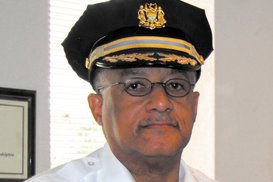Chief Inspector James Tiano, who served as the liaison between the LGBT community and Philadelphia Police for the past 12 years, is retiring at the end of the month, and his role will be filled by a longtime veteran who pledged to carry on his predecessor’s commitment to ensuring the safety of all LGBT Philadelphians.
Stephen T. Johnson, the deputy commissioner of Homeland Security and Domestic Preparedness — now in the process of transitioning to the Office of Professional Responsibility — is a 32-year veteran of the force and a Philadelphia native.
Johnson’s father and uncle both served on the force for decades, and his son is currently a sergeant in the 35th District. His brother, William, is the executive director of the Police Advisory Commission, which investigates complaints against police.
Johnson worked with the LGBT community alongside Tiano in the past, which he said was the main motivator in his volunteering for the open position.
“Several years ago, as an inspector, I worked as a subordinate to Chief Inspector Tiano in the now-defunct Community Affairs Bureau, and I went with him on various liaison projects, so I got to know a lot of people in the community and made a lot of good contacts. So hopefully I’m going to be able to parlay that into a successful venture with this position,” he said.
“I wanted to take this [community] partially because I’d gotten to know a lot of people in the community and I was part of some of the earlier law-enforcement assistance to the LGBT community.”
Johnson noted that he has supported efforts to curb crime against LGBT individuals throughout this career.
“In 1991, before sexual orientation was ever part of the ethnic-intimidation law, when I was the commanding officer of the Conflict Prevention and Resolution Unit — which is the fancy name for the unit that enforces the ethnic-intimidation law — I pioneered a concept where we kept statistics on victimization in the [LGBT] community,” he said. “It didn’t include an enhanced penalty at that time but served as a precursor to that.”
Johnson noted that while violent crimes aren’t commonplace in the Gayborhood, the area is often struck by vehicle thefts, assaults or other crimes that he said the police department takes seriously, especially if the victim’s sexual orientation is a motivating factor.
“A crime is a crime and any type of criminal action has to have a significant response, not only in terms of an aggressive arrest and prosecution, but also in terms of a preventive approach,” he said. “As far as victimization goes, people should never be victimized for who they are or what they believe in. I strongly believe that, and the police department strongly believes in fair and equitable enforcement of the law.”
Johnson acknowledged some LGBT people might be hesitant to out themselves to police when reporting a crime, but said police need to know the full context of a crime to effectively respond.
Johnson worked with many immigrants in South Philadelphia who were initially afraid to report crimes to police for fear of questions about their immigration status, and said he’s committed to treating LGBT victims with the same level of sensitivity.
“We dealt with a great number of people who were victimized within that community and, of course, some were illegal and were hesitant to come to law enforcement for rectification, but we worked out a procedure so that they felt comfortable and so they knew that we’re not INS; we just wanted to help them resolve their issues,” he said. “The LGBT community needs to come forward and admit if they think the victimization was predicated on their sexual orientation and understand that, sadly, that’s the society we live in, but that we do need to know that and we understand and are going to be sympathetic and professional.”
Johnson said he’s eager for his own relationship with the LGBT community to mirror Tiano’s.
“I’m a protégé of Jimmy Tiano. I’ve known him for the better part of 30 years. He was my first platoon sergeant when I was a young highway patrol officer,” he said. “He’s the type of person who’s always led by example. And if you’re able to emulate his good works and his good deeds, then you’re a fortunate individual. So I don’t see anything being any different. The police department is still going to offer the same commitment to resolving issues in all communities, including the LGBT community. We need people to know that we’re there to help and be part of the solution process and hopefully never the problem.”
Jen Colletta can be reached at jen@epgn.com.

